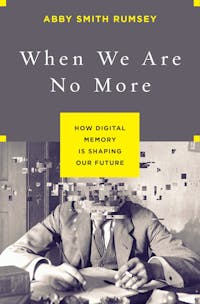When We Are No More
How Digital Memory Is Shaping Our Future
 Download image
Download image
ISBN10: 1620408023
ISBN13: 9781620408025
Hardcover
240 Pages
$28.00
CA$34.00
Our memory gives the human species a unique evolutionary advantage. Our stories, ideas, and innovations—in a word, our "culture"—can be recorded and passed on to future generations. Our enduring culture and restless curiosity have enabled us to invent powerful information technologies that give us invaluable perspective on our past and define our future. Today, we stand at the very edge of a vast, uncharted digital landscape, where our collective memory is stored in ephemeral bits and bytes and lives in air-conditioned server rooms. What sources will historians turn to in 100, let alone 1,000 years to understand our own time if all of our memory lives in digital codes that may no longer be decipherable?
In When We Are No More Abby Smith Rumsey explores human memory from pre-history to the present to shed light on the grand challenge facing our world—the abundance of information and scarcity of human attention. Tracing the story from cuneiform tablets and papyrus scrolls, to movable type, books, and the birth of the Library of Congress, Rumsey weaves a compelling narrative that explores how humans have dealt with the problem of too much information throughout our history, and indeed how we might begin solve the same problem for our digital future.
Serving as a call to consciousness, When We Are No More explains why data storage is not memory; why forgetting is the first step towards remembering; and above all, why memory is about the future, not the past.
Reviews
Praise for When We Are No More
"This book presents a fascinating view into how the mind’s memory functions and all the external devices that complement this aspect of consciousness."—San Francisco Book Review
"Abby Smith Rumsey’s excellent When We Are No More takes a . . . long view of our contemporary anxieties over knowledge preservation . . . Her book is especially good at charting the changing shape of the institutions to which we have entrusted (or outsourced) our collective memory."—Wall Street Journal
"[A] wide-ranging rumination on cultural memory . . . Rumsey draws a powerful analogy to underscore memory’s materiality."—Washington Post Book World
"The goal of When We Are No More . . . is to challenge us to consider more seriously how the consequences of our current data deluge will influence society moving forward. In that, Rumsey succeeds admirably."—Science
"[An] erudite treatise on how the digitization of archival technology makes it all too easy to rewrite our cultural past."—Nature
"In a fascinating, out-of-the-box rumination on the digital age, Abby Smith Rumsey worries that the information monopolists of our day—Google and Facebook—might end up fostering a monoculture not unlike the Christian rulers and Islamic caliphate that purged pagan texts from the Great Library of Alexandria in ancient times."—WorldPost
"Rumsey takes us on a lucid and deeply thought-provoking journey into what makes the human species unique—the capacity to create external memory. This book will change how you think about our collective store of knowledge, and its future."—Paul Saffo, Consulting Professor, Stanford University School of Engineering
"What Oliver Sacks did for the physical mind, Abby Smith Rumsey is doing for our evolving digital mind—making the history and complexity of our collective memory vital to everyone."—Brewster Kahle, Founder of the Internet Archive
"One of the paradoxes of our time is that we live with so much information at our fingertips that we can barely remember anything. How future generations will recall the things that we did and said—if they recall us at all—is the subject of this deeply absorbing book. With the grace and clarity that come from years of reflection, Abby Smith Rumsey illuminates a serious set of problems at the heart of our endlessly self-Googling culture."—Ted Widmer, former Director and Librarian of the John Carter Brown Library, Brown University
"This book is a thoughtful and urgent call to action that is essential reading for all who care about diversity, sustainability, and the advancement of knowledge. Digital memory presents a new challenge; Rumsey provides inspiring insights into the ways in which past challenges have been met and offers a compelling argument to drive the development of new ideas and solutions to this looming threat of inestimable loss."—Sarah E. Thomas, Vice President for the Harvard Library and University Librarian
"'Thoughts that come on doves' feet steer the world,' said Nietzsche. Abby Smith Rumsey’s welcome new book on the importance of digital memory to our shared past—and still more, our shared future—wears its learning and its lessons lightly. But make no mistake. It is a manifesto that comes on doves’ feet, and it comes at a critical juncture, as we begin to envision the memory systems that will be in place ‘when we are no more.’"—Max Marmor, President, Samuel H. Kress Foundation
"As pixels fly by on our multiplying screens, Rumsey reminds us that we have unwittingly committed our modern forms of expression to formats that are all too fragile, dependent on hardware and software that quickly become dated and unusable. With a kaleidoscopic view of history—from Sumerian tablets to the libraries of Montaigne and Jefferson—and a critical analysis of how our minds use recorded information, she warns us that without devoting more attention to digital preservation we will end up with a cultural disorder akin to Alzheimer's, where we live in a troubling, constant present, with little ability to imagine the future. Ensuring perpetual access to our shared culture is one of the most pressing issues of our digital age, and this compelling, important book is a call and plan for doing so."—Dan Cohen, Founding Director, Digital Public Library of America
"For anyone skeptical about the increasing reliance on digital media, Rumsey eases concern by revisiting information inflations of the past, simultaneously conveying the importance of the issue to a more general readership."—Publishers Weekly

